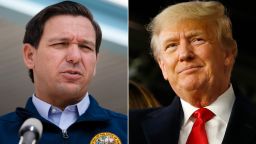Editor’s Note: Nicole Hemmer is an associate research scholar at Columbia University with the Obama Presidency Oral History Project and the author of “Messengers of the Right: Conservative Media and the Transformation of American Politics.” She co-hosts the history podcasts “Past Present” and “This Day in Esoteric Political History” and is co-producer of the podcast “Welcome To Your Fantasy.” The views expressed in this commentary are those of the author. View more opinion on CNN.
A year after Donald Trump left the White House and with the 2022 midterms looming, much of the Republican Party has its sights on what, and who, comes next. Though Trump is still very much in the picture – his recent rally in Arizona had strong back-on-the-campaign-trail vibes – two Republican governors (and the states they represent) have emerged as possible answers to these GOP questions: Virginia’s Glenn Youngkin and Florida’s Ron DeSantis.

But as debates continue about the party’s post-Trump future, it will be critical to see past conventional political labels – lest they conceal the true threats imperiling American democracy.
Youngkin, who won in a state that’s been reliably blue in recent years, has emerged as the party’s new moderate face, a Republican who kept Trump at arms’ length during his campaign and avoided talking about issues like abortion and guns. DeSantis, on the other hand, has positioned himself as Trump’s natural heir, picking up Trump’s trigger-the-libs patois and his conspiracy-driven grievance politics.
Not that the Trump mimicry has earned DeSantis the former president’s favor. In the past few weeks, both men have been taking potshots at each other, with Trump indirectly calling DeSantis “gutless” for refusing to say he got the booster, and DeSantis suggesting Trump botched the early pandemic response.
Yet this framing of the two men as representing two divergent paths forward for the GOP misses the mark. For one, it mistakes rhetoric for substance: on core issues, there is very little daylight between Youngkin and DeSantis. And evaluating Republican candidates based on how they compare to Trump overlooks the bigger picture. Namely, regardless of how the candidates sound, they are all part of the same project: empowering a distinctly anti-democratic Republican Party.
The tendency to see the Republican Party as a body organized by a split between moderates and conservatives goes back decades. In the 1960s and 1970s, the moderate-conservative rift described a set of substantial ideological differences between prominent Republican officeholders.
Moderates like New York Gov. Nelson Rockefeller and Michigan Gov. George Romney supported robust social safety-net programs, feminism and advances in civil rights. Conservatives like Sen. Barry Goldwater wanted to dramatically roll back the federal government’s role in the economy and in civil rights protections. For more than a decade those fights roiled the party, but by the late 1970s, the conservatives had won a decisive victory, cemented in 1980 by the election of Ronald Reagan.
By the 1990s, the party had moved dramatically to the right, and the divisions were no longer about ideology but about absolutism. After President George H. W. Bush failed to live up to his “no new taxes” pledge, which doomed him within the increasingly conservative Republican Party, the appetite for compromise shrank dramatically. House Speaker Newt Gingrich, who rose to power on a wave of uncompromising conservatism, was soon outflanked on his right by even more absolutist members, who constantly attacked him for working with President Bill Clinton on anything.
None of this made Gingrich a moderate, any more than the Sen. John McCain’s 2017 vote against repealing the Affordable Care Act made him one. But even as the Republican caucus moved further and further right, the labels “moderate” and “conservative” shifted with it, concealing the party’s growing radicalism.
That same language is being used to describe the future directions for the Republican Party: the moderate path of Youngkin versus the more conservative path of DeSantis. Youngkin has been widely praised for finding a way to appeal to the White suburbanites turned off by Trump’s coarseness, putting together a coalition that won in a state that has rapidly turned blue in recent years (and that Biden won by 10 points).
DeSantis, meanwhile, governs in a once-swing, now-crimson state, and his rallies have the sort of energy – raw and rowdy – that used to accompany Trump’s. That divergence has left some wondering if voters turn away from Trump and choose more Youngkins, or double down and become the party of DeSantis?
But these frameworks – moderate or conservative, Trump-like or Trump-avoidant – obscure much more than they reveal. First, there is no political substance to the moderate/conservative divide anymore. Youngkin is no moderate. On his first day in office, he issued an executive order banning mask mandates in schools. Though he stopped talking about abortion during the general election, he supports a ban at 20 weeks and pledged to “go on offense” on the issue once elected. And while he acknowledges Joe Biden’s legitimacy as president, he has also played into the big lie about the 2020 election, calling for vote audits in Virginia, where Biden won handily.
He plays culture war with Covid and education rather than abortion and guns, but his policy stances on all those issues are deeply conservative. If there is a moderate in today’s Republican Party – and it’s not clear there is – they do not represent its future.
Likewise, the focus on how similar candidates are to Trump centers almost entirely on personality: how crass and outrageous and brazenly untruthful a candidate can be. Trump certainly opened the door for a new level of shamelessness and conspiracy in politics, and there are plenty of imitators eager to do the same. DeSantis has refined the act some, dog-whistling his outrageousness with regular invocations of the chant “Let’s Go Brandon” (a coded way of saying “f*** Joe Biden”).
Yet while those comparisons with Trump are interesting, they simply aren’t that important. DeSantis and Youngkin both have worked to adapt to Trumpism, to find ways to tap into the excitement Trump arouses in their own way, something nearly every Republican candidate will do in the next few election cycles. But the real question we should be using to assess these candidates is not the moderation of their tone or their relationship to Trump – it’s their dedication to democracy.
In Republican politics these days, that dedication is increasingly rare. Calls for election audits, attempts to strip power from voters, threats of future insurrections – all have been defining features of Republican politics in the past year since Trump left office. Which is why, when it comes to discussions of the future of the Republican Party and who might lead it after Trump, the main question we should all be asking is about the candidate’s relationship to democracy. Are they actively working to undermine it? Are they playing along with the baroque schemes and conspiracies of the antidemocratic right? Are they speaking out forcefully against the insurrection and efforts to undermine future elections?
Where Republicans land on those questions will determine not only the future of the Republican Party, but the future of the republic itself.






